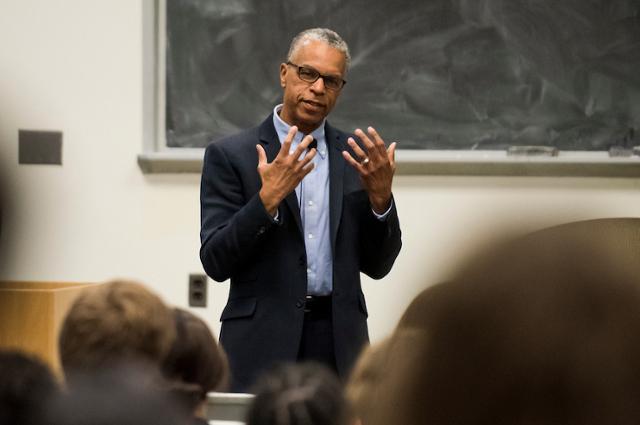-
About
-
Academics
- Physician Assistant
- Special Master’s (MBS)
-
Admissions & Financial Aid
- Tuition & Fees
-
Student Life
-
Research
- Research Labs & Centers
-
Local & Global Engagement
- Global Health Program
Leveling the Field for All Patients
To combat bias, doctors need to understand where patients are coming from, physician and author John Rich told Tufts medical students.

At a time when homicide is the leading cause of death for African American men between the ages of fifteen and thirty-four, doctors, social workers, and other health-care professionals are seeking ways to stem the violence, said John Rich, a physician and professor at Drexel University School of Public Health.
“If you follow those who have been shot or stabbed, five years later 45 percent of them will have been shot or stabbed again, and 20 percent will be dead. It’s unacceptable to do nothing, knowing those rates of morbidity and mortality,” Rich told Tufts School of Medicine students at an October 22 talk about his book Wrong Place, Wrong Time: Trauma and Violence in the Lives of Young Black Men, which was the Common Reading Book Program selection for all incoming medical students this fall (the initiative is supported by Jonathan M. Tisch College of Civic Life).
But quick fixes can do more harm than good, said Rich’s friend and colleague, Roy Martin, who also addressed students. One of the subjects of Wrong Place, Wrong Time, Martin grew up in the Boston area immersed in violence, but meeting and working with Rich changed the course of his life. Today he mentors and supports troubled youth as a case management director at the Safe and Successful Youth Initiative in Massachusetts.
“We make mistakes when we decide the score of the game before we play it,” said Martin. “You may find that what you’re offering is not broad enough, and that predicting what works for everybody is almost as responsible for the failures as anything else.”
What should practitioners do instead? In dialogue with each other and with students, Rich and Martin shared their personal and professional experience with racism, violence, trauma, and offered the audience some concrete ways to understand and support victims—both as future physicians, and as human beings.